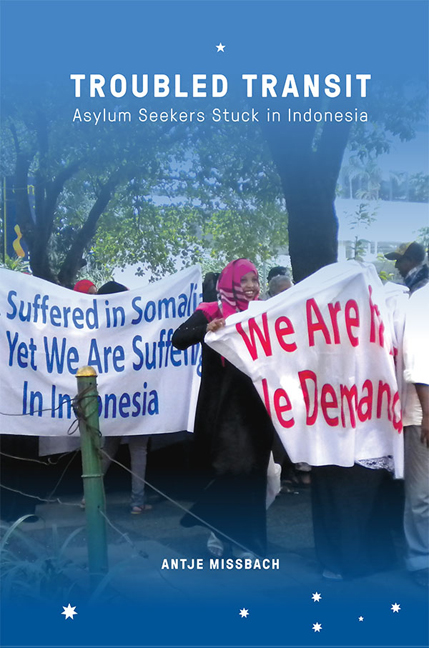Book contents
- Frontmatter
- Contents
- List of tables
- Acknowledgements
- Map of Indonesia
- Acronyms and Initialisms
- 1 Introduction
- 2 Transiting Indonesia: Past and Present
- 3 The Politics of Detention
- 4 Life on Hold
- 5 The Limits of Protection
- 6 Indonesia as a Transit State: Obligations, Policies, and Practice
- 7 Tidal Ebb and Flow: The Indonesia-Australia Relationship
- 8 Selling Hope
- 9 Conclusion
- Bibliography
- Index
- About the Author
- Frontmatter
- Contents
- List of tables
- Acknowledgements
- Map of Indonesia
- Acronyms and Initialisms
- 1 Introduction
- 2 Transiting Indonesia: Past and Present
- 3 The Politics of Detention
- 4 Life on Hold
- 5 The Limits of Protection
- 6 Indonesia as a Transit State: Obligations, Policies, and Practice
- 7 Tidal Ebb and Flow: The Indonesia-Australia Relationship
- 8 Selling Hope
- 9 Conclusion
- Bibliography
- Index
- About the Author
Summary
They create (menciptakan) people like me;
at first, I was not a smuggler.
(Interview with convicted people smuggler, 14 June 2012, Sukabumi)
THE SMUGGLING “INDUSTRY” IN INDONESIA
In this chapter the focus shifts back to the transit migrants in order to explore the correlation between protracted transit and people-smuggling. Through the portrayal of three convicted non-Indonesian people smugglers, it gives an insight into how people-smuggling networks evolved in Indonesia and how they adjusted in response both to increased demand and to intensified enforcement of anti-people-smuggling regulations. It retraces their paths, from rejected asylum seekers to middlemen, recruiters and organizers of people-smuggling ventures. Thus the chapter demonstrates how an extended and more professionalized people-smuggling “industry” is an unintended outcome of Australia's restrictive policies for asylum seekers, of intensified bilateral border control, and of Indonesia's determinedly passive approach to its handling of transit migration.
The hopelessness engendered by spending protracted periods of time in transit has pushed many transit migrants not only to accept higher risks to their own lives during unsafe voyages (Kevin 2012) but also, more significantly, to become actively involved in the irregular transport of transit migrants to Australia. From this perspective transit migrants are not just the clients of smugglers; some of them may also benefit financially from the irregular migration industry as it seeks to satisfy increasing demand among both documented and undocumented asylum seekers and “impatient” refugees. The increase in people-smuggling is, therefore, a result of the absence of legal and timely migration channels; this view is also held by members of the Indonesian police, one of whom stated, “in fact, their decision to create a [people-smuggling] network is based on their despair that they cannot get there [Australia]”. There is also little dispute among scholars of irregular migration that the growth of the smuggling industry is an unintended side effect of stricter visa regulations and increasingly restrictive migration. As George Borjas and Jeff Crisp (2005, p. 3) claim, “there is now good reason to believe that the imposition of restrictive asylum practices has had the effect of diverting migrants to alternative destinations and of prompting them to resort to clandestine forms of movement”.
- Type
- Chapter
- Information
- Troubled TransitAsylum Seekers Stuck in Indonesia, pp. 209 - 236Publisher: ISEAS–Yusof Ishak InstitutePrint publication year: 2015

